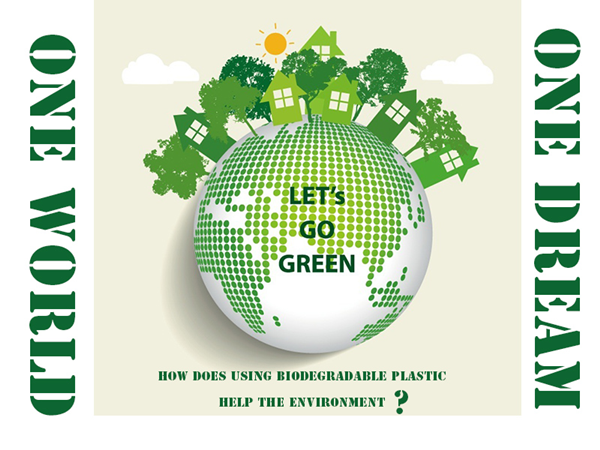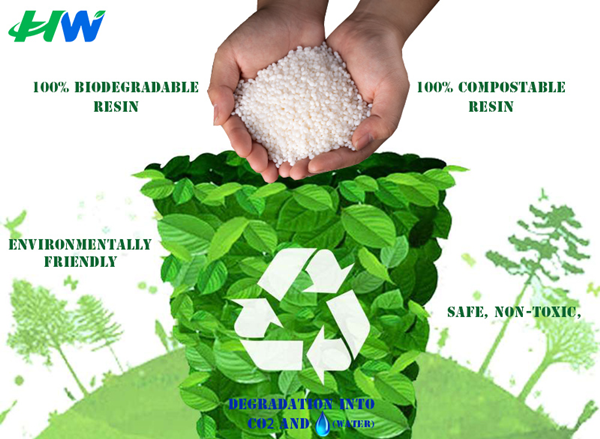The Earth is the common home of humanity, and the prosperity of ecology leads to the prosperity of civilization. Human beings should respect, conform to, and protect nature, and promote the formation of a new pattern of harmonious coexistence between humans and nature. But with the increase in global resource consumption and waste discharge, Plastic pollution is becoming more and more serious. The harm of plastic waste not only affects environmental aesthetics, but its raw materials are also polymer compounds with stable structures and are not easily degraded by natural microorganisms. Non-degradable plastic waste naturally decays for over 200 years, posing great environmental hazards. If plastic waste is not recycled and mixed with the soil, it can cause soil compaction, affect the absorption of nutrients and water by crops, and lead to crop yield reduction. According to the statistics from UNESCO, 100000 Marine mammals and 1 million seabirds die from plastic products every year.

Everything starts from nature, and so does mankind. The earth on which we live is under great pressure. It is urgent for us to take action to reduce Plastic pollution. The prevention and control of plastic pollution not only involves monitoring and investigation, plastic production, and recycling but also involves the formulation of laws and policies, environmental awareness education of the public, and other aspects. Facing the future, we should not only focus on the source and destination of plastics, such as minimizing the generation of non-degradable plastic waste, strengthening the interception and degradation of plastics in the process of sewage treatment, but also improve the public's awareness of plastic pollution and jointly protect our ecological home.
Let's take a look at a consultation record to understand the definition of biodegradable plastics and their environmental benefits:

Q1. Explain the definition of Biodegradable Plastics and their environmental benefits according to appropriate standards.
Biodegradable plastics refer to plastics that are decomposed by microorganisms (such as bacteria), which can be decomposed by microorganisms in the natural environment, ultimately forming water and carbon dioxide. The advantage of biodegradable plastics is that they can be decomposed by microorganisms in the natural environment without polluting the environment. In addition, biodegradable plastics can reduce the accumulation of plastic waste, thereby reducing environmental pollution.
Q2. There are hidden conditions for the degradation of biodegradable plastics. There is no uniform standard for the proliferation of products and the promotion of regulation by circular groups. Based on these two articles, explain the definition of biodegradable plastics and their environmental benefits according to appropriate standards.
Degradable plastics refer to a special type of plastic that can be naturally degraded in a specific environment, has good biodegradability, is conducive to reducing plastic pollution to the environment, and does not produce toxic substances, nor does it cause harm to organisms and the environment. Therefore, the use of biodegradable plastics can reduce the harm of Plastic pollution and help maintain environmental health.
Q3. From an industry and economic perspective, the impact of prohibiting the use of nondegradable plastics and promoting the application of degradable plastics in the industry and catering industry?
Prohibiting the use of nondegradable plastics and promoting the application of degradable plastics has a double-sided impact on the industrial and catering industries. First of all, banning the use of non-degradable plastics can effectively reduce the harm of Plastic pollution, which is conducive to the maintenance and protection of the environment. However, while promoting the application of degradable plastics, the increase in costs may affect the economic benefits of enterprises, especially some small enterprises. Therefore, in the process of prohibiting the use of nondegradable plastics and promoting the application of degradable plastics, these impacts should be fully considered, and effective measures should be taken to alleviate the economic burden on enterprises.
Q4. Is promoting the application of biodegradable plastics in the market more important than promoting disposable plastic recycling and achieving sustainable development in China and other countries?
For the comparison between promoting the application of biodegradable plastics and promoting the recycling of disposable plastics, both are actually important means of sustainable development. The promotion and application of biodegradable plastics can not only effectively reduce Plastic pollution, but also reduce the demand for plastic recycling, thus promoting environmental protection and helping our earth achieve sustainable development. Promoting disposable plastic recycling can also reduce plastic consumption, effectively utilize existing plastic resources, reduce environmental pollution, and thus contribute to China's and other country sustainable development. Therefore, promoting the recycling of disposable plastics and promoting the application of biodegradable plastics are important means of sustainable development, and more importantly, they should be combined to fully leverage their advantages and achieve sustainable development in a more effective way.
In order to actively respond to the call for a "plastic ban order" and significantly reduce Plastic pollution, ecological degradable plastics have promoted the leap forward development of China's degradable industry. Degradable plastics completely degrade into environmentally friendly substances such as carbon dioxide, water, and inorganic substances in the natural environment. It has the durability of ordinary plastic products while not having adverse effects on the environment, making it one of the materials suitable for replacing disposable nondegradable plastics.
Take a small step towards implementing the ban on plastic production, take a big step towards protecting the environment, actively participate in the ban on plastic production, and share a green and beautiful life. From now on, we refuse to use disposable nondegradable plastics to jointly protect our beautiful Earth.
